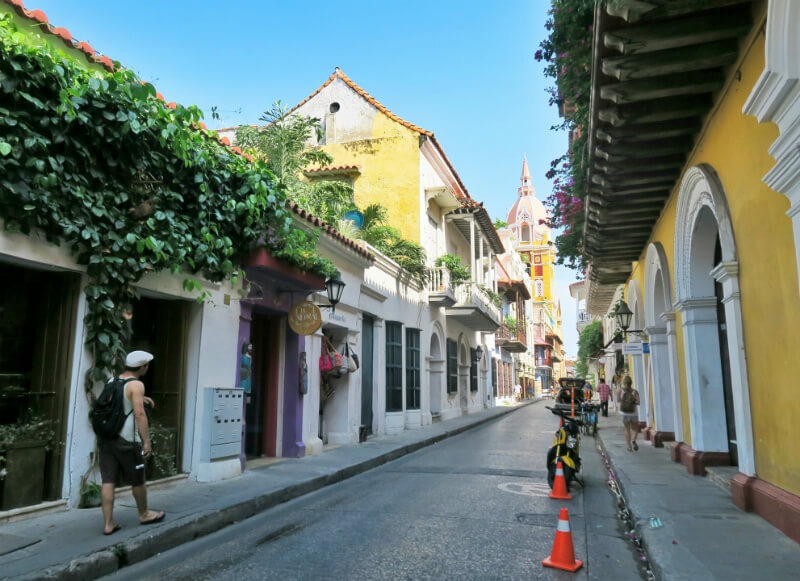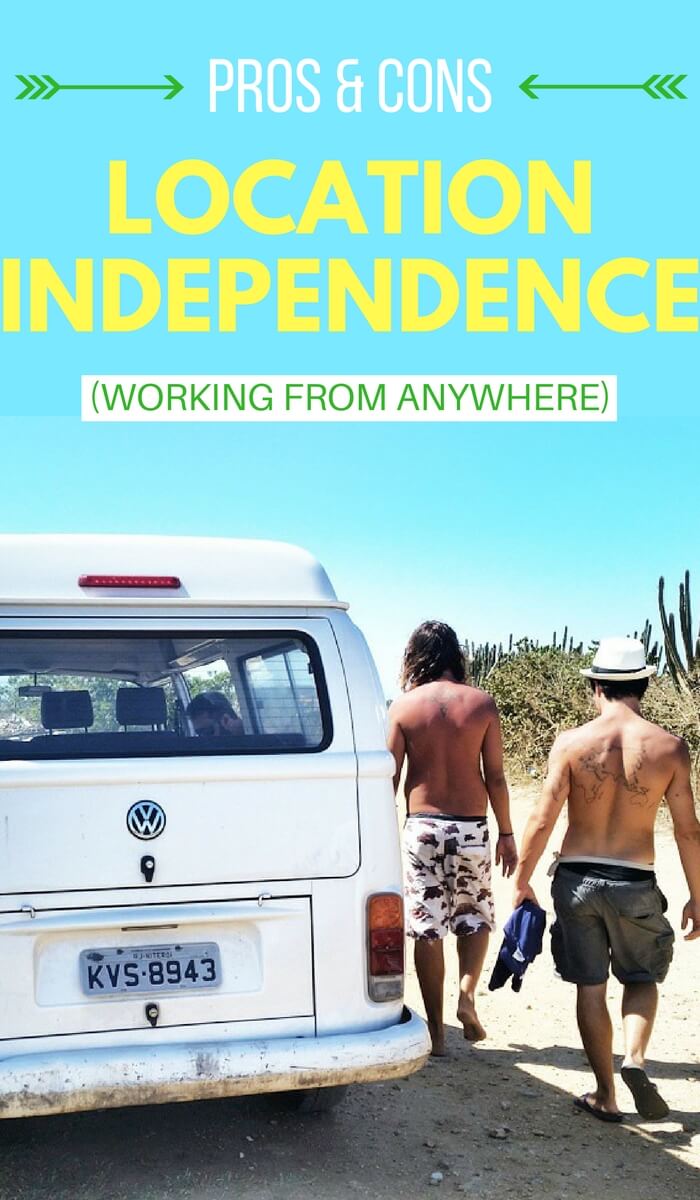Did you know that as the world gets ever more connected, traveling and living around the globe is now available to people from all walks of life?
Perhaps you want to spend a few years living overseas…
Perhaps you want to become a nomad and backpack around the world…
Perhaps you want to start a family elsewhere…
But time, money and commitments are holding you back.
It’s that fear of ‘what if?‘…
How would you be able to work in another country without the appropriate working/residence visas?
How would you be able to travel around the world without running out of money?
How would you be able to support a family abroad with no income…
Well, believe it or not, it is possible to live and travel abroad without having to give up your income.
How?
By becoming location independent.
The Pros And Cons Of Becoming Location Independent (Work From Anywhere)
Pin this to your travel board on Pinterest >>
What Does Being Location Independent Mean?
The definition of ‘location independence’ by coworkation.com:
Location independence is the freedom to work and live from wherever you want. This lifestyle is born out of a desire to be an architect of your own destiny and to have the ability to live life on your terms.
As technology advances, more and more people are realising the possibilities of working from anywhere, particularly online, quitting the rat race and creating more freedom in their lives.
Imagine being able to receive monthly pay-checks or build your own business from anywhere with a WiFi connection…
What Do You Need To Do To Be Location Independent?
 By now you’ve probably heard us talk about remote jobs, freelancing and entrepreneurship, right?
By now you’ve probably heard us talk about remote jobs, freelancing and entrepreneurship, right?
Well, being location independent generally means you fit into one of those categories…
You can choose to work as a remote employee for a company, a freelancer for different clients or you can run your own business (many do it online).
Some people also live off the income they make from renting out property while they are away.
This is how people with a location independent lifestyle are often able to achieve financial freedom, which means that their assets generate income that is greater than their expenses.
How is this possible?
Well, there are a few ways:
- They receive a remote salary, well-paying clients or run a profitable online business
- They own property and profit through rental income
- They rent and sublet numerous properties and profit from the difference
At the same time, they usually live and travel in cheaper countries, which offer the same level of comfort that they would have back home, if not more, yet the cost of living is significantly lower.
When talking about location independence and financial freedom together, it is often referred to as ‘geo-arbitrage’.
Geo-arbitrage basically means taking advantage of the difference in living costs between different geographical localities. If you earn in dollars and spend in Thai baht, you’re immediately better off.
Many people leverage their earning potential by residing (or traveling) in countries with a lower cost of living by becoming location independent and utilising the internet to make an income.
These people may also refer to themselves as ‘digital nomads’ if they travel nomadically (without a base) and utilise the digital world to support themselves.
Sounds like a cool idea, right?
Well today I’m going to explain to you why yes, location independence is freaking amazing at times and, ehhhh not so amazing other times.
Here are 10 pro’s and con’s of being location independent…
Pro: Freedom
 One of the ultimate reasons why people choose to go location independent is because of the amount of freedom they can gain back in their lives.
One of the ultimate reasons why people choose to go location independent is because of the amount of freedom they can gain back in their lives.
Freedom to be where you want…
Act how you want…
Dress how you want…
Surround yourself with the people you want…
It also means financial freedom for many, as we touched on before.
Location independence is the best way to achieve the kind of freedom you dream about when you’re stuck behind a desk doing the same thing day in and day out.
If you want to spend half the day working from a beachside café and the rest of the day working from your lounge room, you can do it, there’s nothing stopping you (apart from terrible internet).
Con: Less time spent with friends and family
 Because you now have the freedom to be where you want, often it means somewhere far away…
Because you now have the freedom to be where you want, often it means somewhere far away…
But the problem with this is that when you move away, you immediately stop spending as much time with your loved one’s and start spending more time making short term friendships instead.
You may miss a few birthdays…
A few Christmas’s…
The birth of your niece…
It doesn’t feel good to miss those special occasions, but at the same time you can’t be there for all of them.
You may be thinking, why? You can earn an income from anywhere…
Yes but even so, flight tickets to the other side of the world every month are not cheap.
So if you are very close with your family and friends, consider living or traveling nearby so you can make more frequent visits.
For example, Australians may go to Bali, North Americans may go to Colombia and Europeans may go to Spain or Portugal.
Pro: Travel the world
 This is a big reason why so many people choose to become location independent… You get to see the world!
This is a big reason why so many people choose to become location independent… You get to see the world!
Imagine spending 6 weeks in Thailand… Another 6 weeks in Italy… And another 6 weeks in Morocco…
Being location independent means that you can work from anywhere… So why not make it literally anywhere in the world?
And because you’ll be earning an income every month it’s not like going on vacation…
You don’t need to save for a year before you go anywhere and your income doesn’t stop when you step out of the ‘office’.
Traveling simply becomes your lifestyle.
Instead of paying for rent, car loans, insurance, electricity/water/phone bills, etc, and not being able to go anywhere…
You can stay in fully furnished short term rentals, use Uber for transport, take out travel insurance, get a pre-paid sim card for your phone, and travel around the world.
Many location independent digital nomads say that for them, traveling is cheaper than staying in one place.
Think of all the incredible experiences you can have, important lessons you can learn and beautiful memories you can create through seeing the world with your own two eyes.
Con: Lack of stability
 One of the main issues with being location independent is the lack of stability in all aspects of your life.
One of the main issues with being location independent is the lack of stability in all aspects of your life.
When you start freelancing or become an entrepreneur you’ll soon realise that ‘feast or famine’ is real.
Most freelancers and entrepreneurs experience times when they don’t know where their next pay-check is coming from.
This can cause stress, worry and a complete feeling of instability.
Some even choose to give up the possibility of location and financial freedom before they’ve truly reached it, because a stable pay-check from a ‘normal job’ seems more attainable/sensible.
The other thing is lack of stability in your home life.
Without a permanent base, it can be difficult to ever feel ‘whole’.
Constantly moving around hardly ever gives you the opportunity to just settle, feel comfortable and focus on other things like your business or social life.
Living out of a suitcase can feel restricting as well. Every time you see something you like, you have to think, “can I fit this in the suitcase?“…
So then there goes any opportunity to decorate your temporary living space how you like it or purchase things like kitchen appliances that help you to live/eat better…
And that’s another point. Constantly moving from place to place can cause total instability in your diet, fitness and general health.
If you normally work out in a gym, it’s more difficult to do this when you are only based in a place for a month. Many gyms require you to be a member or if not, it’s far more expensive to pay for one-off visits.
Cooking and eating healthy can also be problematic if you travel a lot and are often stuck with no kitchen. Because what happens? You eat out…
Not only is eating out all the time more costly, you often end up eating more of the naughty stuff.
Then there are things like health check-ups and dentist visits. Not only can these things be difficult to deal with in a foreign country, you’ll probably just forget about even doing it altogether.
Pro: No commute
 Hands up who has to sit in hours of traffic every day just to get to a job you dislike in order to pay for the car loan and petrol which are needed to get you said disliked job?
Hands up who has to sit in hours of traffic every day just to get to a job you dislike in order to pay for the car loan and petrol which are needed to get you said disliked job?
Sounds ridiculous, doesn’t it?
I know people who spend 4 hours per day sat in traffic. They leave the house at 7am to start work at 9am, then they leave work at 6pm to return home at 8pm… Then they do it all over again the next day.
And I’m not blaming those people for doing that because, you know, earning an income is important…
But if they knew that they could do the same job remotely or turn their skills into a freelance career or business, they would immediately gain back 4 hours of their life to spend time doing something that actually matters to them…
Like spending time with family…
Or learning something…
Or working on a side business…
4 hours per day, 5 days per week, 48 weeks per year… That’s 960 hours or 40 days per year they could be spending doing something they love.
So when you become location independent, the commute simply doesn’t exist.
Your commute may look something more like a leisurely bicycle ride down to the nearest coffee shop…
Or a flight to another city, in which you can do something productive meanwhile…
No more waiting around, location independence will help you to make-up for all that lost time.
Con: Disrupted routine and productivity
 When you’re constantly on the go, traveling around and not particularly settling down anywhere you visit, your routine get’s completely screwed up.
When you’re constantly on the go, traveling around and not particularly settling down anywhere you visit, your routine get’s completely screwed up.
I know people say that routine isn’t good for you but that’s not the truth. Having some kind of routine is important in everything we do.
Our most notable pioneers didn’t get to where they were without having a routine…
Steve Jobs woke up at 5am every single day.
This meant that he was, on average, 2 hours ahead of everyone else.
He had 2 more hours every day to work on making his company stand out from his competitors.
Even if you are an earlybird, traveling consistently really disrupts your flow and it can take ages to get back into it… Then you go and travel again.
Staying productive is essential when you’re working for yourself because without it, you lag behind on work, you may lose some clients, business will slow down and… “Oh shit, how am I getting paid this month?”
So my suggestion is, if your plan is to travel, do it slowly.
Spend at least a couple of months in each place and secure a base. There are many short term rentals available – Airbnb for example.
This way, you can spend the week working from your ‘home’, local café or co-working space, get into a semi-routine, eat a good breakfast, etc, and then visit new cities on the weekends.
You still get to see the world but in a more sustainable way.
Pro: Flexible schedule
 While routine is important, it doesn’t mean that you can’t create a different schedule.
While routine is important, it doesn’t mean that you can’t create a different schedule.
The best time to work is when you feel the most productive and can dedicate at least a few hours in one sitting to your tasks.
So if you have children who do homeschool…
Or you like to study in the mornings…
Or you don’t work as productively in the afternoons…
Work around it.
Unless you are a remote employee with set hours, being location independent allows you to adjust your schedule to fit your lifestyle, not the other way around.
Con: Loneliness
 Let’s face it, traveling to a completely different country where you don’t know anyone can feel daunting…
Let’s face it, traveling to a completely different country where you don’t know anyone can feel daunting…
Who will be there to support you when you need it most?
Who can you share all these special new memories with?
Who can you go for a simple coffee and chat sesh with?
Of course, when you travel, making new friendships is easily done, especially if you stay in hostels and spend all of your time going out…
But when you become location independent, it’s not quite the same.
You’re not on vacation anymore, it’s your lifestyle, and this may be difficult for other travelers to understand.
You can’t just go out and get drunk every night and then spend the next day laying in a hammock hungover…
You can’t really ‘live’ in hostels…
And you can’t follow every good friend you ever make to their next destination. It’s just not feasible.
So it’s more beneficial to form friendships with other expats and location independent individuals who live a normal life, just in a different place every now and again.
Even then, it can still feel lonely when those people eventually pack up and move somewhere else, or if you decide to do the same.
Unfortunately, as special as your friendships around the world may seem at the time, it’s not uncommon to lose contact.
Sometimes, all you want and need is the support of your friends and family back home.
And like I said earlier, if this is the case, stay somewhere nearby so you can make more frequent visits.
Pro: Diversity
 When you have clients based all over the world or your business runs in multiple countries and currencies, it’s a lot more difficult to feel the burden when shit goes down…
When you have clients based all over the world or your business runs in multiple countries and currencies, it’s a lot more difficult to feel the burden when shit goes down…
Like the economic crisis here in Brazil for example…
If we were a brick and mortar business, serving only Brazilian clients, things probably wouldn’t look bright for us…
But being location independent allows us to diversify how we earn an income and where that income comes from.
Think about it… Working online gives you access to the whole world.
Providing you can operate in the English language, there’s no need to limit yourself to one geographical area.
Con: You’re not on vacation
 Think someone who has a location independent lifestyle is on constant vacation?
Think someone who has a location independent lifestyle is on constant vacation?
Think again.
There is this unrealistic expectation that if you have a job or business that allows you to work from anywhere, you can be on permanent vacation.
Work 4 hours a week like Tim Ferriss talks about…
Spend the rest of the time laying in hammocks and sipping cocktails on the beach…
Umm, no, not exactly.
Anyway, wouldn’t that just get boring after like, a week?
In most cases being location independent means you have to work as hard as everyone else, if not harder.
You don’t just make money from the click of a few buttons (as much as some online scam artists will have you believe).
Running an online business or working as a remote employee is just the same as doing it offline, except you can do it from anywhere.
So while you can work from a café on a tropical beach in Bali, or in the mountains of Nepal, or on a cobblestone street in Italy, it doesn’t mean you can just click a few buttons in the morning and then go off and ‘vacay’ for the day.
When we travel, we like to have breakfast, go drink coffee/work until lunch time, eat somewhere cheap for lunch, find another café, work until around 2:30pm/3pm and then go off and explore.
And of course, most of the time we leave evenings and weekends free for exploring too.
So, our conclusion about location independence?
 Some people do wonder, “well, if you spend most of the day working inside a café, what’s the point in even being location independent?”
Some people do wonder, “well, if you spend most of the day working inside a café, what’s the point in even being location independent?”
And the answer is simple…
Because we can get caffeinated in any café of our choice…
In any city around the world…
And the ‘commute’ home to our beautiful $200 p/m furnished log home in the mountains of Thailand?
A blissful scooter ride alongside luminous green rice paddies and bamboo huts…
The commute home to our spacious, central apartment in Amsterdam?
A romantic bicycle ride over tiny canal bridges and through cosy cobblestone streets, picking up a Nutella waffle on the way…
While there are some significant cons of being location independent, we’re still all for the location independent lifestyle and would encourage anyone who has been considering it to give it a go.
Life is short, make what you want of it!
Over to you! Leave your answers in the comments section below…
- Have you been considering becoming location independent? What stage are you at? The researching, the planning or the packing? Tell us about your plans below…
































Comments are closed.